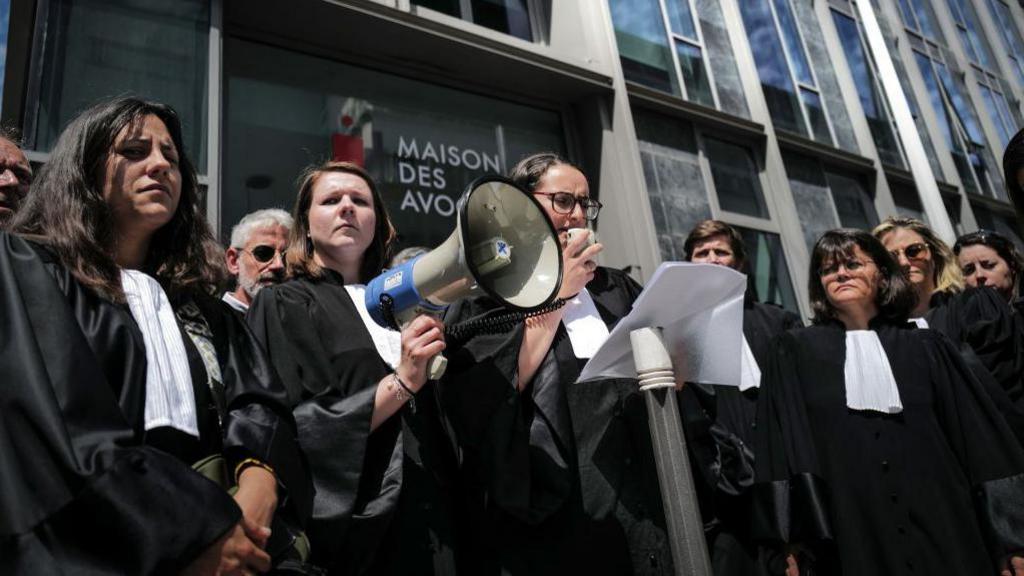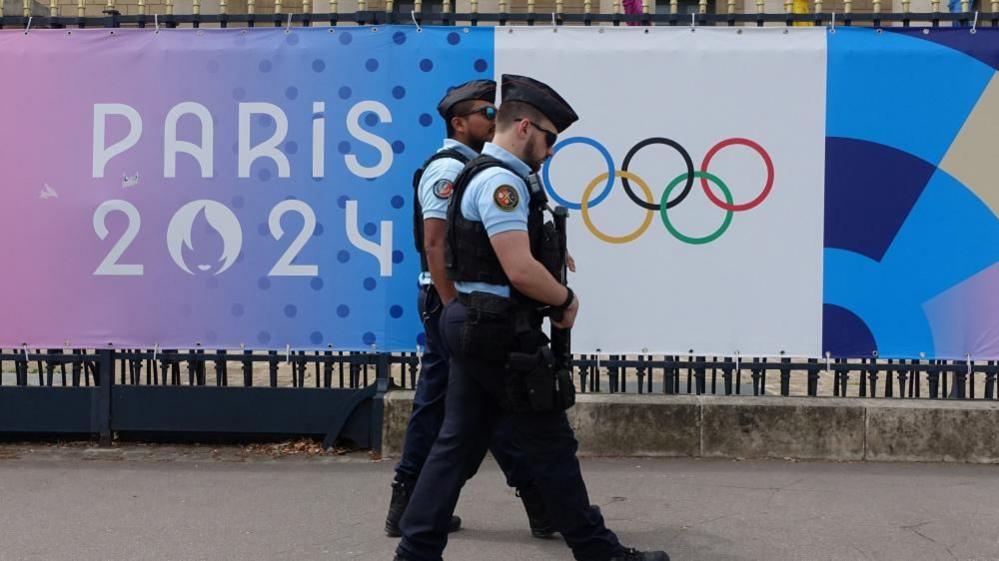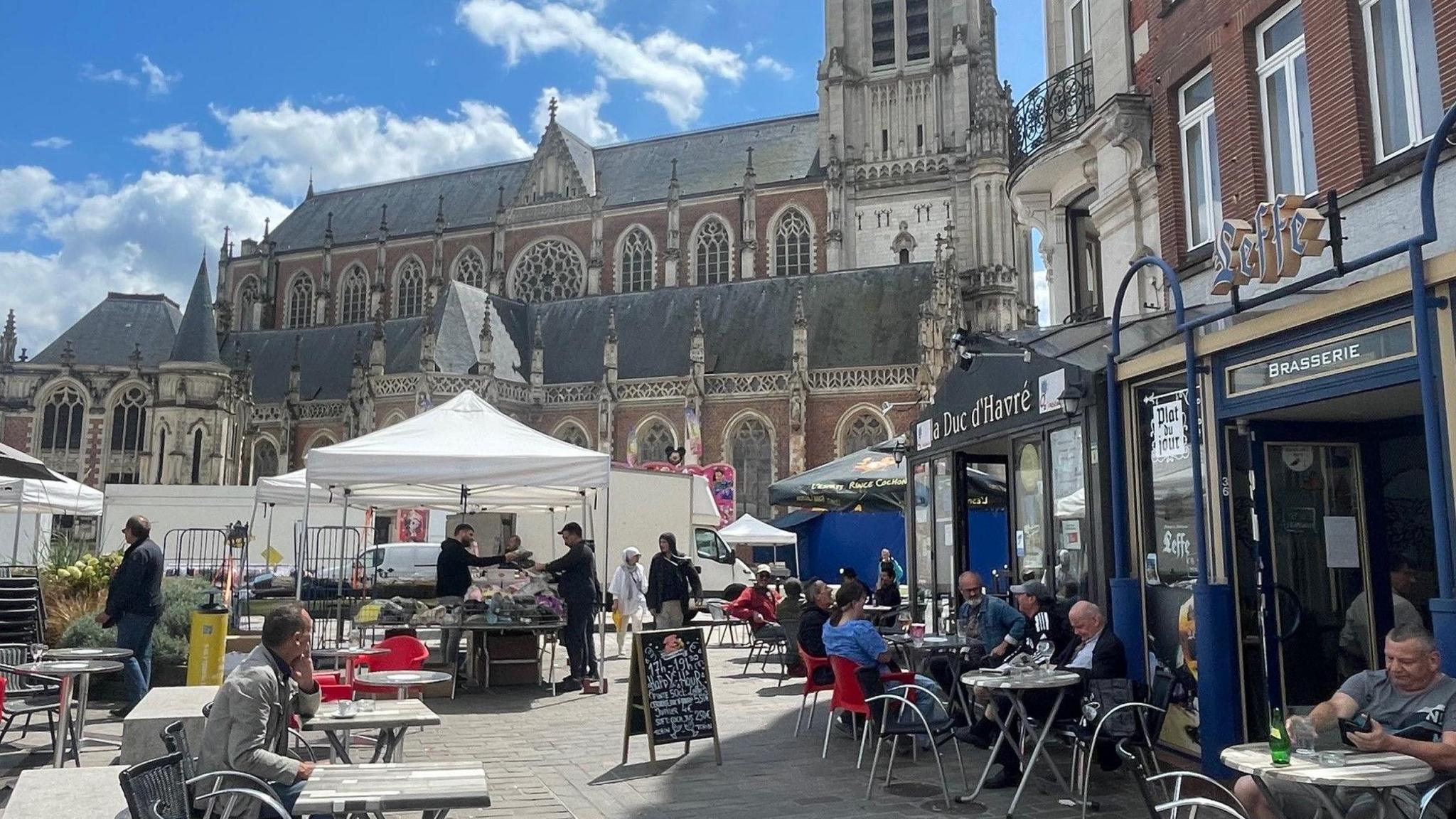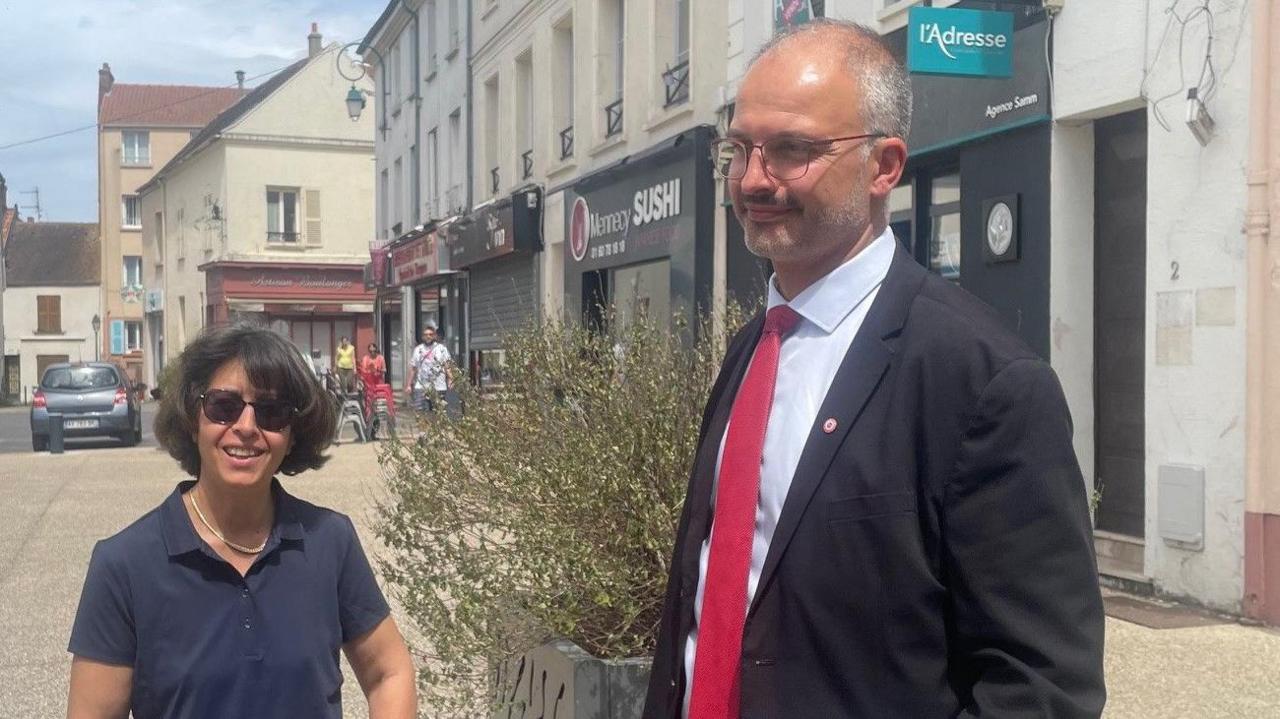France ends ugly campaign and draws breath before historic vote

French lawyers protest after an extremist network publishes a list of "lawyers to be eliminated"
- Published
France’s rushed and sometimes violent election campaign is over, brought to an end with stark appeals from political leaders ahead of Sunday’s pivotal vote.
Centrist Prime Minister Gabriel Attal said on Friday night that a far-right government would “unleash hatred and violence”.
But the leader of the National Rally, Jordan Bardella, accused his rivals of immoral, anti-democratic behaviour, and he urged voters to mobilise and give him an outright majority.
One in three French voters backed National Rally (RN) last Sunday, in the first round of parliamentary elections.
The choice a week on is between France’s first far-right government of modern times or political deadlock, and voters fear there is turmoil ahead whoever wins.
The climate is so fraught that 30,000 extra police are being deployed.
Interior Minister Gérald Darmanin said 51 candidates, or their deputies or party activists, had been physically attacked by people of varying backgrounds, including some who were “spontaneously angry”.
In one incident, an extremist network published a list of almost 100 lawyers "for eliminating", after they signed an open letter against National Rally.

Police are already out in force for the Paris Olympics and now they are being deployed for Sunday's vote
President Emmanuel Macron’s decision to call it less than a month ago came as a shock, but the consequences are unknown.
When voters speak about the election, the tension is often palpable.
Kaltoun’s hair is covered and says in her town on the border with Belgium, where RN won the first round, she and her daughter have felt increasingly uncomfortable. “It’s a remark or a look; each election it’s got worse.”
In nearby Tourcoing, Gérald Darmanin is facing a strong challenge to hold his seat from the far-right candidate who was just 800 votes behind him last Sunday.

France's interior minister is up against a far-right local candidate in his home town of Tourcoing
That is why left-wing candidate Leslie Mortreux decided to pull out of the second round to give him a better chance of defeating RN.
In the 500 seats being decided by run-off votes, 217 candidates from the left-wing New Popular Front and the Macron Ensemble alliance have withdrawn to block the RN from winning. Although dozens of three-way races are still going ahead, 409 seats will now be decided by one-on-one contests.
After the first round, some opinion polls gave RN a chance of winning an outright majority in the National Assembly.
The final polls of the campaign suggest that is no longer on the cards. Even if RN boss Marine Le Pen believes they still have a “serious chance” of winning the 289 seats they need to control the Assembly, the pollsters say about 200 is a more realistic figure.
One major poll that came out hours before the end of the campaign suggested that the awkward series of withdrawals by third-placed left-wing and centrist candidates had succeeded in scuppering the hopes of National Rally boss Marine Le Pen’s protege of becoming prime minister aged 28.
“We are presiding over the birth of a single Mélenchon-Macron party,” Jordan Bardella complained. “And this dishonorable alliance has been formed with the single goal of keeping us from winning.”
The Popular Front is made up of Socialists, Greens and Communists, but its biggest party is France Unbowed, led by radical firebrand Jean-Luc Mélenchon.
He is widely condemned by his rivals as an extremist, and he is certainly no ally of President Emmanuel Macron.
Despite their agreement to keep out the far right, there is no love lost between the two camps.
“You don’t beat the far right with the far left,” the interior minister said, even though a France Unbowed candidate had pulled out to help him win.
The Macron centrists are third in the polls, well behind the Popular Front as well as the National Rally.
“In France we’re fed up with Macron, and I’m more in the centre” said Marc in Tourcoing. “The cost of living is bad, and the rich have become richer and the poor are poorer."
Fifty violent attacks shock France ahead of crunch vote
- Published5 July 2024
In Marseille, pétanque masks political divides ahead of Sunday's vote
- Published4 July 2024
Analysis: Le Pen's party now dominant force in France
- Published30 June 2024
National Rally has focused its campaign on media appearances by Mr Bardella and Marine Le Pen, and there have been claims of “phantom candidates” barely showing up in some areas.
When one candidate in the city of Orléans, Élodie Babin, qualified for the second round with little attempt at campaigning she later insisted she had been ill for 10 days.
RN is especially popular in rural areas.
In Mennecy, a sleepy town in the Essonne area south of Paris, Mathieu Hillaire was holding his final campaign event as Popular Front candidate. He is in a duel with RN candidate Nathalie Da Conceicao Carvalho, after the pro-Macron candidate pulled out to give her left-wing rival a better chance of blocking the far right.

Matthieu Hillaire (R) of the New Popular Front is in a run-off with RN in the Essonne area south of Paris
Mr Hillaire said while the climate was less tense locally than elsewhere some people were still worried: “Of the voters that I’ve met, there are many who are scared of Jordan Bardella.”
Many of RN’s policies focus on cutting the cost of living and tackling law and order, but their anti-immigration plans have raised particular concerns.
RN aims to give French citizens “national preference” over immigrants for jobs and housing, and wants to abolish the right to automatic French citizenship for children of foreign parents, if those children have spent five years in France from the age of 11 to 18.
Dual citizens would also be barred from dozens of sensitive jobs.
Prime Minister Gabriel Attal spoke of an “uncertainty and worry” among the French people.
He said in the first round his party had averted the risk of Jean-Luc Mélenchon winning a majority. Now the risk came from a far right whose policies would “unleash hatred and violence with a plan to stigmatise some of our fellow citizens” and be catastrophic for the French economy.
But what happens on Sunday night if there is deadlock, and no obvious way forward towards forming a government?
The Olympic Games are now only 20 days away, and there is a suggestion that France might have no government or prime minister when it hosts such a high-profile global event.
Mr Attal, who had earlier suggested his minority government might stay in place “as long as necessary”, was far more vague on Friday night.
“Next week I don’t know what I’ll be doing, where’ll I’ll be doing it,” he said. “But I know who I’ll be doing it for: the people of France, that’s all that counts for me.”